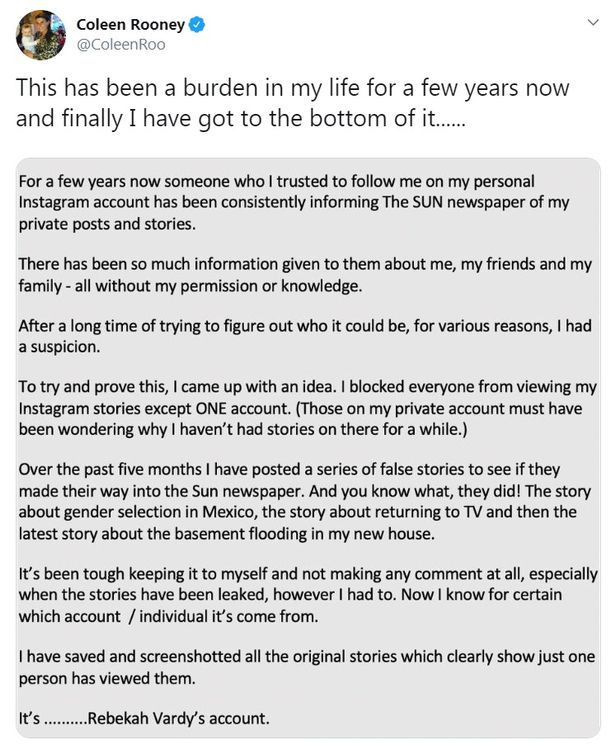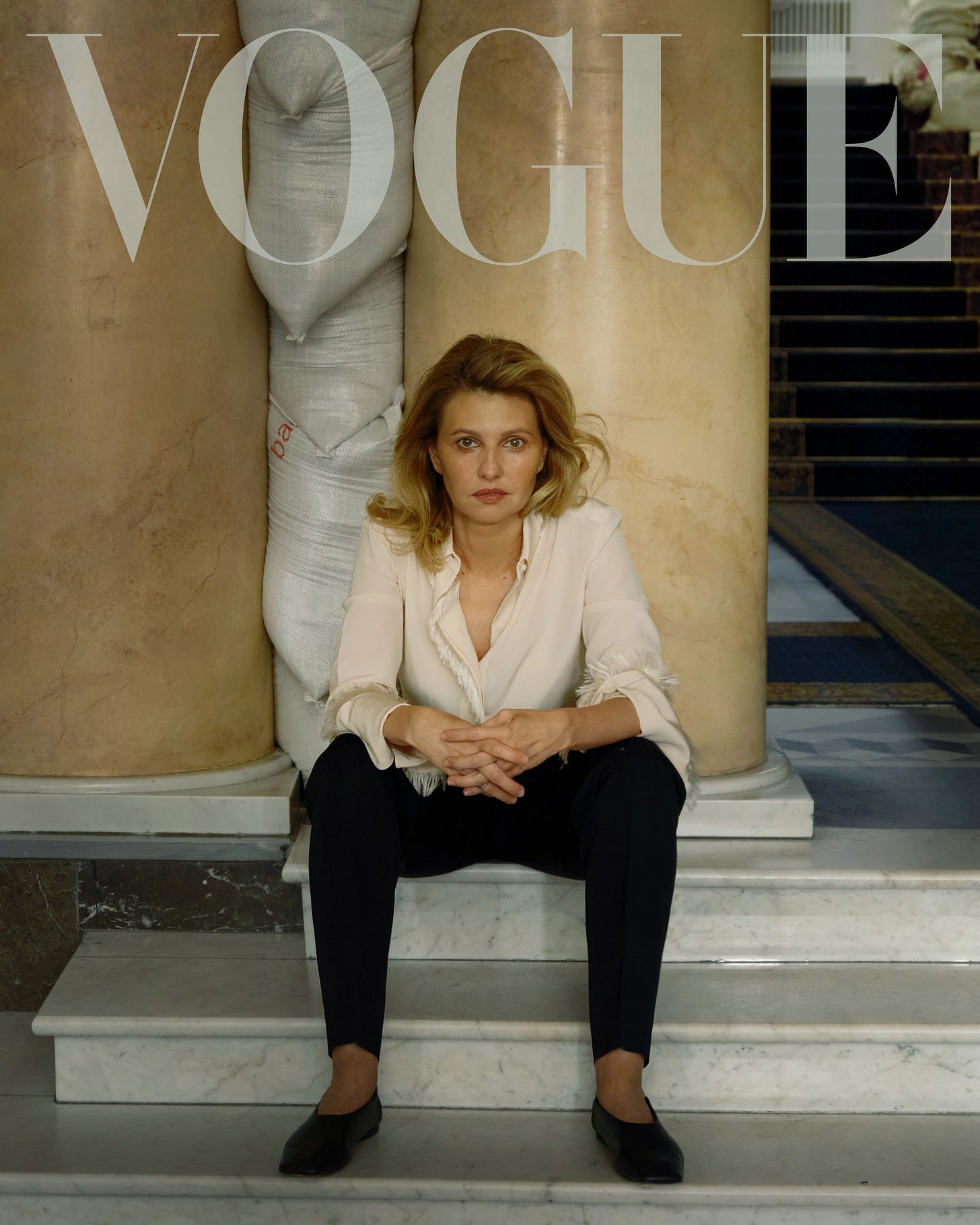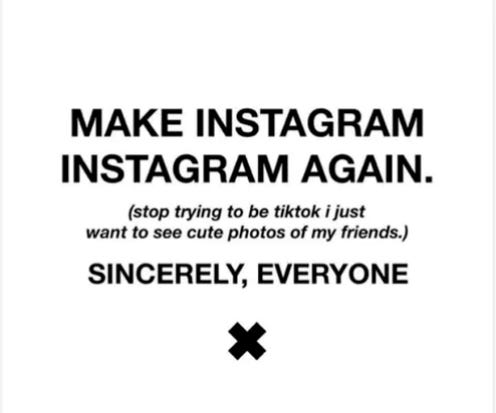Borkowski Weekly Media Trends: 29-07-22
The Wagatha Christie Verdict | Vogue's Olena Zelenska Shoot | When social media users rebel
Wagatha Christie: the modern-day cultural classic that we'll soon forget
It's a scientific fact that every single Briton knows where they were when "It's ...........Rebekah Vardy's account" flooded our social feeds and became an instant cultural classic. And today, after a three-year legal battle, we can finally close the chapter of the "Wagatha Christie" epic.
Brand experts and media gurus have been quick to draw a line under the saga, estimating both party's brands from the case's fallout. However, its very nature is so vacuous and isolated that there might be no substantial winners and losers. Experts have been quick to proclaim there are immediate winners and losers, but as this marathon draws to a close, we'll be incredibly quick to forget.
Rooney is in the dominant position, but judging by her character and how she's conducted herself over these gruelling three years, she'll likely keep a low profile, hoping the verdict takes the sting out of the broader story.
And for Vardy, the result has forced her hand, but it'll be the same outcome: she must keep a low profile. Vardy won't gain from reactive brand deals or stunts; in fact, it would cause permanent damage. But with many discussing her spectacular own goal, its impact will be fleeting. The case brought much joy and meme fodder, but most will look to move on swiftly - it's already a perfect tale.
Let's hope younger generations are drawn closer to Agatha Christie, in a similar trend to Stranger Things popularising Kate Bush and 'Running Up That Hill'. In the end, it's been a wild ride, but it's time to let go.
War in Vogue: can fashion ever avoid glamorising big issues
It is bound to be divisive when American Vogue publishes a photoshoot of Ukraine's first lady, Olena Zelenska.
For one, the classic trope of glamorising tragedy comes to mind. Twitter's critics were quick to dismiss the campaign, with some taking issue that Vogue portrayed Zelenska wearing make-up, which is just a critique of the pictures being aesthetically pleasing. But are all war pictures bound to be considered tasteless, or is Vogue an outlet that cannot uphold the gravity of issues so grave?
The photographs of the First Lady are serious, perhaps even sombre. Yet, despite broader criticism, there is an apparent effort to draw attention not to Zelenska's looks but to her surroundings: sandbags, soldiers, the life underground. The marble steps the First Lady is seated on evoke grief over the country's greatness buried under rubble.
The couple portraits with President Zelenskyy look sad but dignified. Annie Leibovitz, who took the pictures, has shot in war zones before – one of her most famous images is of a bike knocked on the ground with a smear of blood next to it, taken during the war in Yugoslavia. The distinct difference between that image and the pictures of Zelenska seems not to be any particular sense of glamour but the 'VOGUE' superimposed above her head. Nevertheless, the response to the photo shoot shows that it is just enough to push a campaign into dangerous territory.
While the pictures themselves might not be an issue, and the text of the accompanying article is far from frivolous, one can still find, in small print, a list of the brands the First Lady was photographed wearing. The messaging of the article is clear: it is meant to raise awareness about the war. But if there is any part of the Western society that remains unaware, or untouched, by the Ukrainian war, and Vogue positions itself as an outlet that reaches these exact audiences, the entire project looks like a plea to the blasé elites who won't pay attention - unless it looks pretty.
The situation is reminiscent of March's Balenciaga fashion show, dedicated to the Ukrainian refugees, where the guests were given T-shirts to wear in the colours of the Ukrainian flag during the show. Of course, many didn't, but when they did, they were simultaneously posing for front row pictures as they always would.
Perhaps fashion is just too commodified to be a carrier of profound messages. Perhaps Annie Leibovitz would be better off keeping these photographs for another publication. But unfortunately, balancing good intentions with an audience-conscious strategy can be a delicate task, and it looks like Vogue's risk will never entirely pay off.
When social media users rebel (but they don’t leave)
People dislike change. Think back to every major overhaul of the Facebook page; no doubt each revision was met with some grumbling. But even if we criticise social media, it seems we become attached to the way things are at a certain moment in time and want them to stay frozen there.
Stasis, however, is a good business strategy, especially when you have new apps like TikTok breathing down your neck. Instagram came under fire this week when Kylie Jenner re-posted a viral meme complaining that Instagram was becoming focused on reels, that is, too much like TikTok. Her post (below) caused a storm of people agreeing and prompted a response from Instagram.
Amid outcries that Instagram is ‘rubbish’ at the moment, the generation that Kylie represents fondly remembered days when Instagram was a place to see photos of friends. As such posts from Kylie Jenner can wipe $1bn from a company’s value, Instagram quickly responded. But many seem unconvinced, and some were even shocked by his apparent ‘revelation’ that Instagram ‘would continue to support photos’. CEO Adam Mosseri made their strategy explicit, arguing that Instagram is under pressure to keep up with the times and that most of its content would become video over time.
In the petition that the Kardashians shared, there are demands to bring back more photos. As the platform incentivises more video content, photographers, who pioneered the app, feel left out. (Indeed, many photographers who represent such controversial subjects as the human body feel they are being ‘shadowbanned’ and remain convinced that tech platforms continually use cutting-edge artistic producers to create a space and make it fashionable, then kick them off to shield them from criticism.)
As an example of comms strategy, Instagram’s decision to face the criticism head-on of laying its plan bare is of dubious impact.

Though it doesn’t seem to have dampened the fire (‘Instagram is Over’), the question remains - will users leave, or are they sufficient hooked that they will stay, albeit a bit unsatisfied?
Those who stayed with Facebook until the bitter end may remember the glory days of ‘Mobile Uploads’ when you would post one hundred grainy blackberry photos after a night out. Things change, and though we might not use Facebook the same, the company persists in different permutations. However - platforms should not necessarily ignore these warning signs of user discontent. Yesterday, Meta reported its first-ever decline in revenue since it went public. It seems Meta will always be doomed to toe the line between keeping up with the times and ‘if it ain’t broke, don’t fix it…’









